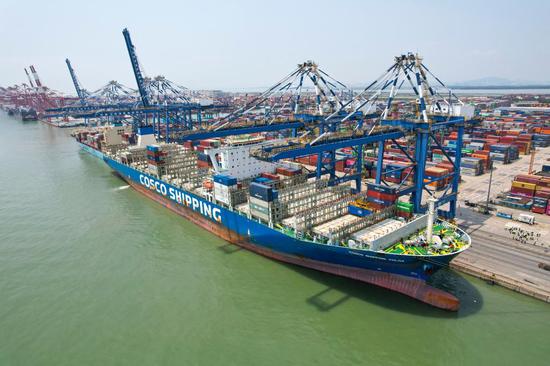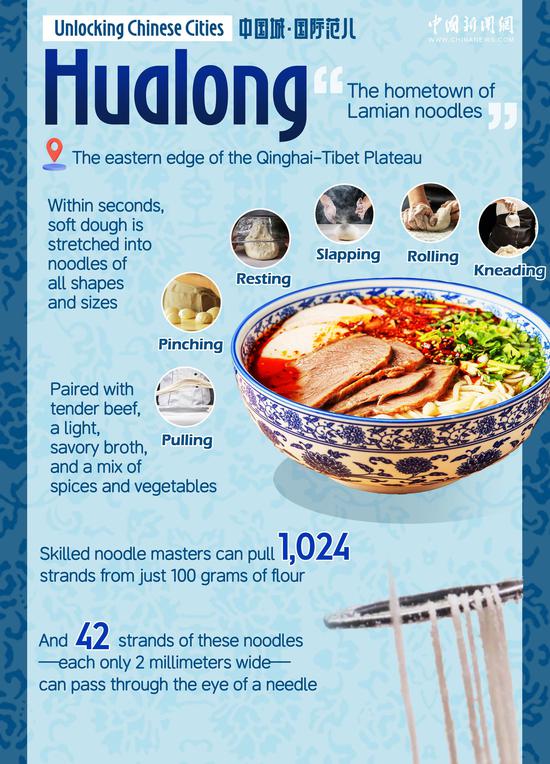
A foreign merchant talks to a staff member at the 136th China Import and Export Fair in Guangzhou, Guangdong province, in October. (HUANG TAIMING/FOR CHINA DAILY)
Chinese cross-border e-commerce platforms have gained in popularity among U.S. consumers who are flocking to these online marketplaces to buy products directly from Chinese suppliers amid the latest rounds of tariff hikes from the Trump administration.
Experts said in the face of rising trade protectionism and a volatile external environment, China's cross-border online retailers should realign supply chain networks, diversify business layouts in emerging markets, and expand sales channels to reduce dependence on a single market and navigate tariff challenges.
Chinese cross-border business-to-business e-commerce app DHgate recently secured second spot in downloads on the Apple App Store in the United States, just behind OpenAI's ChatGPT.
Industry insiders attribute DHgate's popularity in the U.S. to Chinese suppliers and manufacturers using the short-video platform TikTok to educate U.S. consumers on the global luxury goods market.
Many products, such as clothing, handbags, and accessories that are assumed to be European-made, originate from factories in China. Shoppers can buy these products directly from Chinese merchants via cross-border e-commerce platforms like DHgate, they added.
Founded in 2004, DHgate has served more than 100 million registered buyers across 225 countries and regions by connecting them with over 2.78 million sellers worldwide.
Sales of home appliances, outdoor sports equipment, pet supplies, healthcare and beauty products, as well as electronic devices have seen robust growth overseas, according to DHgate.
The company said its current growth trajectory is not a fleeting phenomenon, but the result of years of effort to foster a trusted ecosystem with micro, small, and medium-sized enterprises and source manufacturers.
Taobao, the online marketplace owned by tech heavyweight Alibaba Group, has surged to the top of the Apple App Store's downloads in 16 countries, and is among the top 10 in 123 countries.
Wang Peng, an associate researcher at the Beijing Academy of Social Sciences, said the increased overseas traction of Chinese e-commerce platforms demonstrates China's strong capabilities in manufacturing.
"Chinese factories, which depend on improved supply chains and supporting abilities related to production, can churn out commodities with high cost-effectiveness. The products have gained an upper hand in terms of cost and price compared with that of their counterparts around the world," Wang said.
Against the backdrop of global inflation, U.S. consumers have greater demand for high-quality and low-priced goods, which has made Chinese e-retailers the preferred shopping platforms, Wang said.
As a new form of foreign trade, cross-border e-commerce has become an important driving force for China's exports amid downward economic pressures and external uncertainties, experts said.
The country has rolled out a series of policy measures that include establishing cross-border e-commerce comprehensive pilot zones and supporting the building of overseas warehouses and logistics infrastructure to facilitate the development of cross-border e-commerce.
Jenny Perez, a university student in New York, said she loves to buy Chinese-made commodities, but the recent tariff increases have affected her shopping concepts and habits now that she has to pay more. "I would prefer to buy clothes from Chinese manufacturers via e-commerce platforms directly, rather than from agents," she said.
The U.S. administration has announced that shipments valued at or under $800 from China to the U.S. will face 120 percent tariffs or $100 per item from May 2 to June 1, and then $200 per item beginning June 1. Prior to that, it has decided to end the duty-free de minimis treatment for low-value imports, starting on May 2.
Hong Yong, an associate research fellow at the Chinese Academy of International Trade and Economic Cooperation, said the recent policy shift will not only result in reduced supply and fewer choices for U.S. consumers, but will also have a negative impact on the overall development of the global e-commerce industry.
In order to mitigate the impact of tariff hikes, Chinese cross-border online retailers should invest more in establishing overseas warehousing, accelerate steps to expand their footprint in diverse and emerging markets, and strengthen cooperation with international logistics enterprises to boost delivery efficiency.
Chinese cross-border e-commerce platforms including Shein and PDD Holdings' Temu have taken steps to cushion the impact of the revocation of the small-package tax exemption. Temu began adding Chinese sellers to its site that have inventory at U.S. warehouses last year, allowing it to ship packages faster to U.S. shoppers.
PDD Holdings has recently announced plans to invest 100 billion yuan ($13.7 billion) over the next three years to support the Chinese merchants on its platform, step up subsidy efforts to small and medium-sized enterprises, and help them cope with challenges in the process of overseas expansion.


















































 京公網安備 11010202009201號
京公網安備 11010202009201號